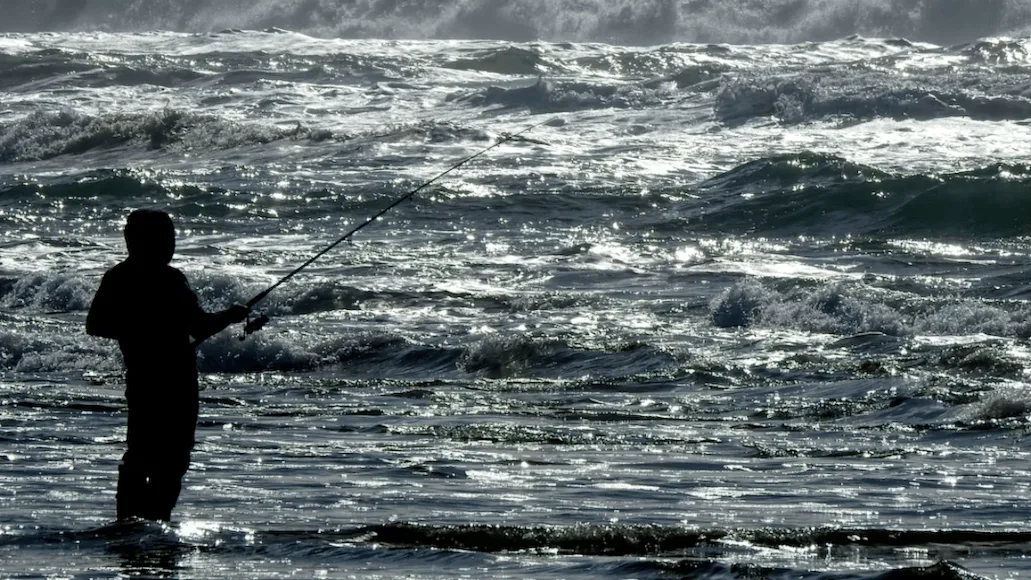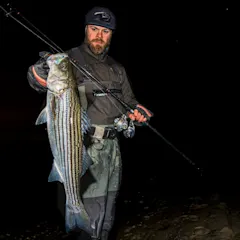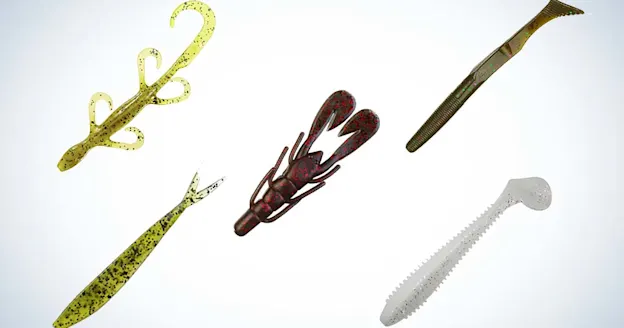_We may earn revenue from the products available on this page and participate in affiliate programs. Learn more ›
_
Best Overall
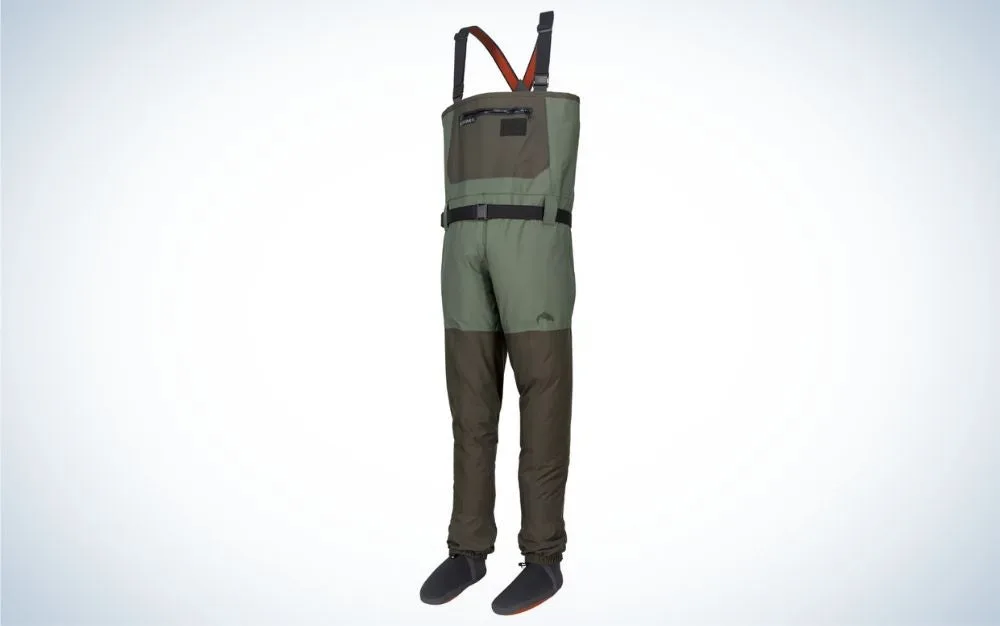
Simms Freestone Stockingfoot Waders
LEARN MORE
Summary
A winning combination of breathability, extreme durability, and moderate price make the Freestone an easy pick for best overall surf fishing waders.
Best Budget
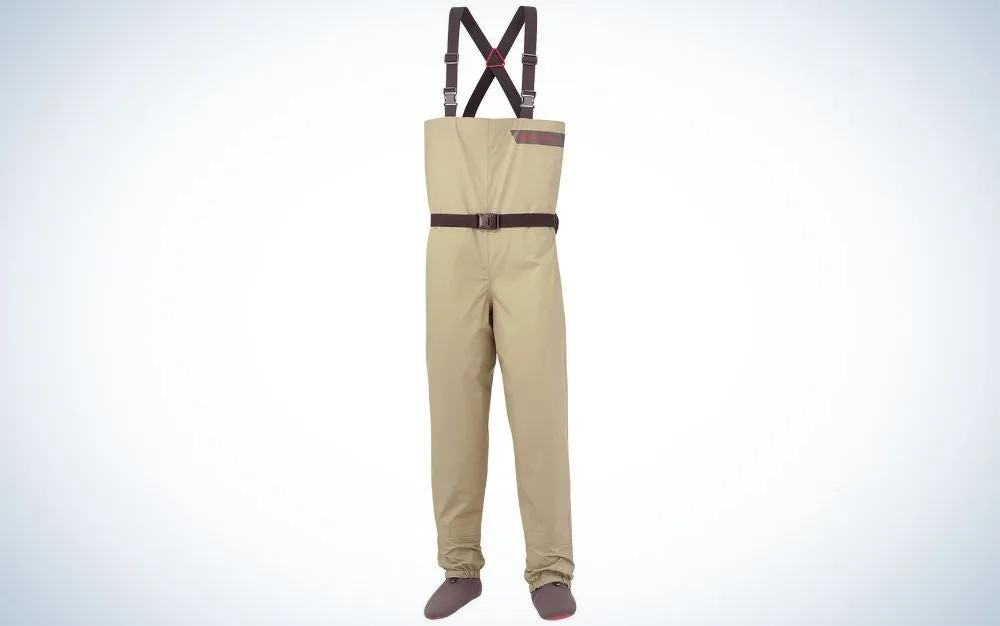
Redington Crosswater Waders
LEARN MORE
Summary
If you’re just getting started surf fishing or only fish a few days a year, these are simple, breathable, inexpensive waders that perform well.
Best Stockingfoot
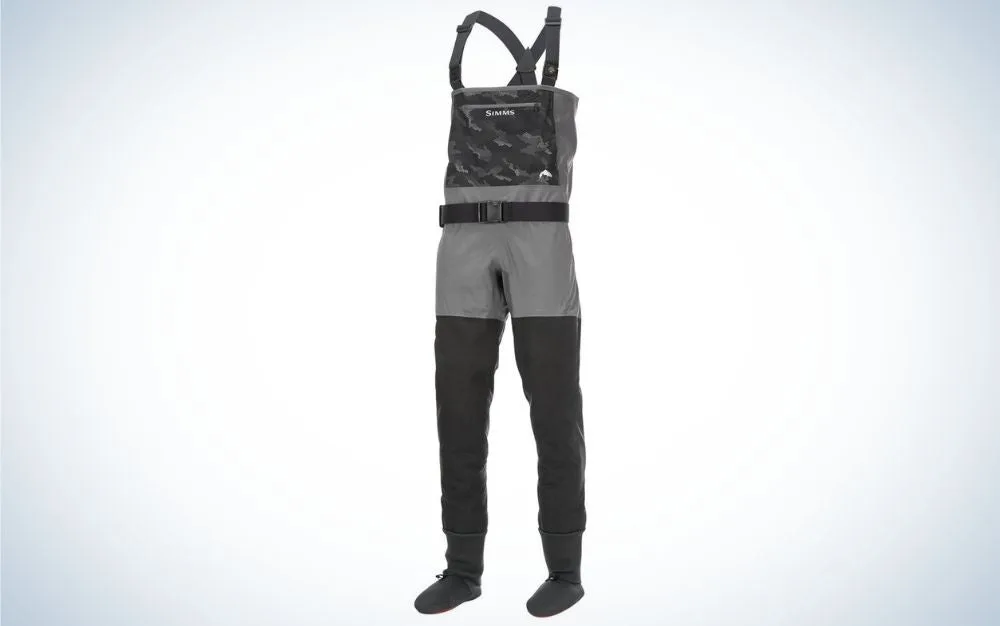
Simms Guide Classic Waders
LEARN MORE
Summary
If you fish a lot and push yourself and your waders to the limits, these waders are the best combination of durability and breathability available at any price.
The surf is a demanding environment, and thus your waders for surf fishing are going to take a beating. There are so many ways to rip, tear, or puncture your waders that getting a highly durable and rugged pair is important. Further, waders are notorious for making you sweat, even when the weather is cool. Having a pair that isn’t only tough but also breathable makes fishing much, much more enjoyable. However, high quality waders aren’t cheap, and many budget models are ruined quickly while fishing the surf. For this reason, it’s important to understand the most important factors in choosing a good pair. Below are my choices for the best waders for surf fishing for every budget.
Best Overall: Simms Freestone Stockingfoot Waders
Best Budget: Redington Crosswater Waders
Best Stockingfoot: Simms Guide Classic Waders
Best with Boots: L.L.Bean Double L Stretch Bootfoot Waders
Best Overall: Simms Freestone Stockingfoot Waders
Best Overall

Why It Made the Cut: A winning combination of breathability, extreme durability, and moderate price make the Freestone an easy pick for best overall surf fishing waders.
Key Features
Construction: Four layers, top and bottom
Membrane: Toray QuadraLam
Sizes: Small to XXL/ Regular, Short, Long, King / Boots 7-13
Pros
The toughest waders out there
Good breathability
Quality pockets, straps, gravel guards, and stocking feet
Lots of sizes for every body type
Moderate price
Cons
Not the most breathable
The Simms Freestone waders are the toughest, most rugged waders I have ever owned, even compared to pairs that cost a lot more. The Toray fabric is thick and strong, and I noticed far fewer “mystery” punctures that are often caused by hooks, brambles, rubbing against rocks, etc. They held up well to multiple falls (in and out of the water), clambering on rocks and jetties, and more than 300 miles of walking on rocky shorelines and sandy beaches. These are the only waders to successfully stand up to my extremely hard use for two full seasons (freshwater fishing, too), and I would expect them to last many years for the average angler. The stocking feet are warm, comfortable, and tough and the gravel guards are decent. The Freestones have a fleece-lined reach-through style pocket, X-style shoulder straps, and an attachment zipper inside for all kinds of accessories. They’re also assembled in the USA.
The downside to these waders is their breathability, which I suspect has something to do with how thick and tough the fabric layers are. That isn’t to say they’re bad—they still breathe fairly well—but they’re just not the best.
Best Budget: Redington Crosswater Waders
Best Budget

Why It Made the Cut: If you are just getting started surf fishing or only fish a limited number of days a year, the Redington Crosswater waders are simple, breathable, inexpensive waders that perform well.
Key Features
Construction: Three layers, top and bottom
Membrane: DWR Coating
Sizes: Regular / Small to XXL / Boots 7-13
Pros
Very low price
Breathable layers outperform some more expensive waders
Comfortable and simple waders that will get you on the water
Cons
Not very rugged—these will tear or puncture relatively easily
No pockets
I’m a big fan of Redington gear overall, as it typically offers a lot of “bang for your buck.” These Redington Crosswater waders are a good option if you’re looking to try out surf fishing on as low a budget as possible. They are lightweight, breathable, and simple waders that are no-frills but will keep you dry. I found these waders to be surprisingly breathable, on par with waders that are far more expensive. The sizes are accurate, and the straps and feet are comfortable. The fabric is flexible and easy to move around in.
The biggest negative to these waders is their durability, which isn’t great. If you are fishing the surf a lot, walking long distances, or climbing on boulders or jetty rocks, they won’t last very long. Constructed of three thin layers, they’re designed for weekend trout fishing, not the rigors of the surf day in and day out. Further, they don’t have any pockets and the straps, buckles, and belt are not very high quality. These should be considered only as waders to get you started or as a good set of back-up waders.
Best Stockingfoot: Simms Guide Classic Waders
Best Stockingfoot

Why It Made the Cut: If you fish a lot and push yourself and your waders to the limits, then the Simms Guide Classic represents the best combination of durability and breathability available, at any price.
Key Features
Construction: Three layers with reinforced legs
Membrane: Gore-Tex
Sizes: Small to XXL/ Regular, Short, Long, King / Boots 7-13
Pros
High breathability while still being seriously rugged
Reinforced legs prevent holes and rips where they happen most
Comfortable fit from top to bottom
Excellent gravel guards, comfortable shoulder straps, and multiple pockets
Cons
Missing some fancier features of high-end waders
Price is considerably high
If you are looking for the best blend of breathability and durability at any price, the Simms Guide Classic waders are an easy top pick. These waders slot in between the cheaper rugged Freestones and the premium ultra-breathable G3 and G4 waders. I own all three of these models and like the Classics the best. More breathable than the Freestones, they’re also tougher than the G3s. I appreciate the extra durability, and don’t mind the small hit in breathability. I find these waders fit the best of all my waders, too. While the pocket and shoulder straps aren’t the fanciest, they function just fine on the water. I like the single, large soft-pocket on the front, which holds a lot of stuff if needed. The neoprene gravel guards are the best in the industry at keeping sand out of my boots. They’re also assembled in the USA.
However, these waders are not cheap. The surf is a brutal place, and rips and tears are always a risk, so ruining $500 waders on the very first tide is possible. However, Simms offers an excellent warranty on these, and they are less expensive than other alternatives.
Best with Boots: L.L.Bean Double L Stretch Bootfoot Waders
Best with Boots
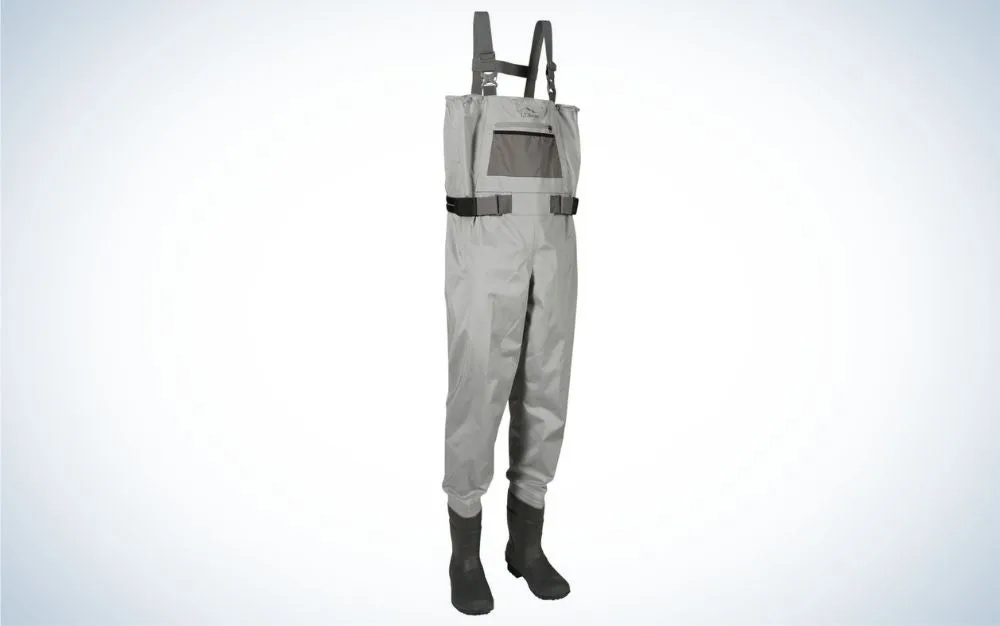
Why It Made the Cut: If you insist on sticking with waders with built in boots, the L.L.Bean Double L Stretch Bootfoot Waders are the best combination of durability, breathability, and price.
Key Features
Construction: Three layers
Membrane: Proprietary
Sizes: Small to XXL/ Regular / Boots 7-13
Pros
One of the only high-quality boot-foot waders still available
Good breathability and durability
Waders are properly sized and fit well, including shoulder straps
Price outcompetes competitors with a solid warranty program
Cons
Boots aren’t the most comfortable
There are tougher waders available at this price
I remain adamant that waders with built-in boots are a thing of the past for surf fishermen. However, if you like the simplicity and sand-proof characteristics of bootfoot waders, I recommend the L.L.Bean Double L Stretch Bootfoot waders, which offer a much higher quality. The waders are breathable, so you shouldn’t have trouble staying cool even on warmer days. The material is relatively tough, though it is not nearly as durable as some of the offerings from other brands. The boots hold up well, even at the seam, but they certainly aren’t the most comfortable footwear. I found the heel a bit too high and the boot itself very wide to accommodate all foot-types. Still, if you are after a bootfoot wader, there is no better high-quality pair at a moderate price.
Things to Consider Before Buying Waders for Surf Fishing
Breathability
How breathable your waders need to be comes down to two factors: how hot the outside temperature is and how much you walk. How cold it gets is generally not very important—it’s easy to layer wool and fleece under waders, and I regularly fish in water that is in the 40s with air temperatures in the 30s in the same waders I use all summer long. However, you can only decrease the layers under your waders so much when it’s hot.
Breathability can vary immensely between waders based on construction. Most modern waders are made with multiple layers, which are important for breathability, strength, and ruggedness. However, it’s the thin Teflon layer in between those layers that makes them truly waterproof and breathable. Teflon allows water vapor (like sweat) to escape through billions of microscopic holes without letting water in. Gore-Tex is the most well-known brand that uses this technology.
The fabric layer quality is also paramount, and where you’ll see the biggest difference in breathability. Cheaply made fabrics won’t breathe as well, even if they have a quality chemical layer in between. Additionally, the less layers there are, the more breathable the waders will be.
I personally think walking and hiking impacts how much breathability you need even more than water or ambient temperature. If you’re walking long stretches of sandy beach or scrambling over rocks for hours, you’re going to sweat. The difference between a good set of waders and a cheap pair is remarkable in terms of how much of that sweat evaporates to the outside environment. I’ve had budget “breathable” waders accumulate sweat puddles in the feet because they weren’t actually breathable at all, despite the companies claims.
Durability
Most high quality waders are tough enough to last for many seasons when wading in a typical trout stream. However, the surf is a totally different game. Most anglers I know that fish hard will only get a couple seasons out of their waders, even if they are extremely durable and expensive. (I rarely get more than a single season out of mine, but I fish five to seven nights a week for six to seven months of the year, with hundreds of miles of walking.) There are just so many sharp objects to pierce or cut your waders, from boulders and jetty rocks to oysters and mussels to hooks. Further, surf anglers walk many miles and even bike in their waders which wears down the ankle, knee, and crotch panels quickly. The friction from sand will also wear through leg panels and feet.
I recommend choosing fishing waders
with at least three-panel construction, and I have had even better luck with waders that are reinforced with four panels, especially from the knees down. This decreases breathability—the more layers, the less they will breathe—but what does breathability really matter if your waders are constantly leaking? Some of you might be thinking that you’ll just buy cheap waders and replace them as they leak. Don’t do it. In the end, you’ll spend just as much or more replacing waders over and over, and you’ll be a lot less comfortable the whole time regardless. It’s all about trade-offs, but I typically think waders in the $250 to $500 range offer the right mix of durability, breathability, and value.
Stockingfoot vs. Bootfoot
Stockingfoot waders have a neoprene foot that you will have to buy a separate boot to put over. The advantage here is a more comfortable boot, better ankle support, far less weight, and easier customizable studding. Often, even the best-fitting bootfoot waders aren’t as comfortable as mid-tier stockingfoot waders with budget boots. Bootfoot waders tend to be a little less expensive than stockingfoot waders and separate boots, but the price difference is often not enough to make it worth it. The advantages of bootfoot waders are simplicity and the fact that no mud or sand can enter the boot. No matter how good your boots are, sand has a way of getting in between the stockingfoot and boot, and this can be uncomfortable and eventually wear holes in the waders.
I prefer stockingfoot waders. They are so much more comfortable and lightweight and there are lots of excellent boots for stockingfoot waders that do a phenomenal job of keeping sand and mud out from between the boot and the stockingfoot. If you only fish sandy beaches and want the ultimate sand-free boot for stockingfoot waders, I recommend the Hodgman Neoprene Wading Shoe
. I love these and use them in place of normal boots when I’m fishing on sand-only.
Material
As far as neoprene waders go, I don’t recommend them as your primary set of waders. Designed for cold water, they’re primarily for winter and early spring fishing in cold water. They’re tough, but if you try to wear them in even moderately warm weather, you’ll be miserable and soaked in sweat. Because you can layer as much as you want under your waders, thermal capacity doesn’t matter. Save your money, get better breathability, and go with thinner waders.
Fit
Wader fit has come a long way since I started wearing them 30 years ago. Most companies have switched to more athletic cuts, with more panels and anatomically shaped feet to help with durability, fit, and mobility. Waders that are as comfortable as possible and offer full range of motion make a world of difference when you’re out in the surf. I would never consider the old PVC waders anymore. You want to forget you’re even wearing waders and be totally focused on fishing, not your clothing.
When buying waders, many anglers get the advice to go too big to “save room” for extra layers and socks. While waders shouldn’t be tight—they won’t fit like normal pants or overalls—having too much room in the chest, legs, or feet is not good. This is uncomfortable and can lead to chafing and durability issues. Baggy waders with legs rubbing together, stocking feet that are bunched up in the boots, or waders that are stretched when making high-steps or climbing on rocks can all stress the materials and seams. Instead, buy waders that offer just enough room to accommodate the most wool, fleece, and polypro socks and under-layers you’ll need in colder weather.
Many companies offer a lot more sizes than ever before, including short, tall, king (extra large body), women’s, and even kids’. It pays to try a few different brands and even different models within brands, because sizing will vary.
Other Features
While I wouldn’t get too caught up in accessories, there are a few features I really like. Most important to me is a secure and “dry” gravel guard, ideally made of neoprene with a sturdy attachment. The better it stays over my boot, the less sand, pebbles, mud, and gravel can get in. When you’re standing in waves or walking on sandy beaches, this makes a huge difference. I also really like a quality easy-to-use front pocket. It doesn’t necessarily have to be waterproof enough to keep a phone in, but I want to be able to put flies, leaders, soft-plastic lures, or other small items in without worrying about them. If the waders only have a water-resistant or wet front pocket, then I want a waterproof inner pocket, too.
The other extra I’ve come to demand in my waders is a quarterback-style hand warmer pocket. Similar to what you’ll find on a hooded sweatshirt, it’s great for warming up my hands in the winter, or using as a secondary pocket for small bits of gear in the summer.
One thing I’ve tested extensively and don’t like is a front zipper. While it’s convenient, every model I’ve had leaks. It’s just another piece to fail in the demanding surf environment. Plus, models with a front zipper tend to be more expensive, so I’d encourage you to skip it.
FAQs
Q: Do I need waders to go surf fishing?
The honest answer is “maybe.” For most of the United States in the summer, the answer is no. For many states in the Southeast and Gulf, you may never need waders, even in the winter. However, if you’re going to fish in colder climates in winter, spring, or fall, waders will either be essential (it can be dangerous without them), or at the very minimum make you much more comfortable. For me, I consider waders necessary all season long. For others, they may be something worn only during the very coldest times of the year.
Q: How do I choose the right size of wader for surf fishing?
The easiest way is to follow the sizing chart on the manufacturer’s website, which will give you foot size, waist, inseam, and chest size (or some combination of those factors). However, I often choose wader sizes based on foot size and T-shirt size. For example, I wear a size 9 boot, so I choose waders in sizes 9 to 11 to allow plenty of room for heavy socks. Not all waders are exactly the same, though. If you are extra tall or short, or have unique proportions, you may have to modify your fit.
Q: How do I properly care for surf fishing waders?
Besides avoiding sharp objects, care for waders is pretty simple. I rinse mine with fresh water and let them dry in shade or partial sun after each use. Occasionally, I’ll also use a rag and mild dish soap to wipe them down if they start to get really dirty. This can allegedly help recover or retain breathability, but I haven’t really noticed a big difference. The key is to just rinse sand, dirt, and salt off because it helps them last longer. Make sure to rinse the feet, too.
If they start to get dirty or stinky inside, I use disinfectant spray and/or a rag with dish soap, rinse with water, and let them dry inside out. Don’t put them away wet inside or leave them in direct hot sun.
Final Thoughts
A good pair of waders—like great surf fishing rods
—can make or break a fishing session. Whether they’re one of your essentials or just something you use occasionally, there’s no denying that a pair that fits well and breathes adequately makes surf fishing far more enjoyable. If you’re wearing them all the time—especially around rocks and jetties—having durable waders that will last becomes essential. The waders on this list represent a good cross-section of options at all budgets, and will help you be more comfortable and catch more fish this season. Good luck and tight lines!
Methodology
My choices for top fishing waders for the surf is based on 30 years of angling experience, which includes surf fishing on both the East and West coasts of the USA for a large variety of species. My primary angling pursuit is surf fishing for striped bass, and I spend about 140 nights a season (about 700 to 1,000 hours) chasing these fish throughout the Northeast, from New York to Canada. Over the years, I have personally used a number of different waders from various brands, costing as little as $70 all the way up to $600. Right now, I own 10 pairs of waders from 5 companies, but I have tested many, many more than that. I also know many professional anglers, industry professionals, top-tier tackle suppliers and retailers, and some of the very best citizen anglers—all of whom have informed my choices here.

